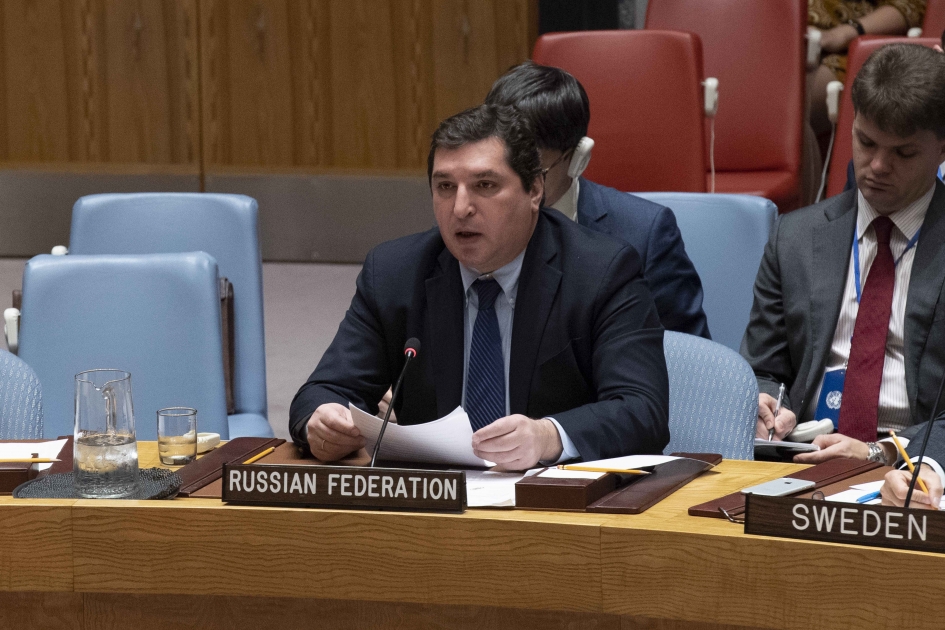Statement by Mr.Vladimir Safronkov, Deputy Permanent Representative of the Russian Federation to the United Nations, at the Security Council on the situation in Iraq
Historically, Iraq has been an important factor for stability in the Middle East.
Russia supports constructive steps aimed at strengthening Iraq’s domestic political situation and ensuring the country’s security and socioeconomic development in full respect for its sovereignty, independence and territorial integrity. We note the enormous contribution of the United Nations and Special Representative Kubiš in stabilizing the situation in Iraq.
We know that this is a result of his ability to establish constructive and mutually respectful dialogue between all the political stakeholders in Iraq. We were pleased to see that the parliamentary elections held in May culminated in the election of the Republic’s top leadership. We emphasize that Russia respects the sovereign choice of the Iraqi people and we urge everyone to do the same. We welcome our Iraqi partners’ successful and decisive efforts to combat the terrorist threat.
Much has been done on the counter-terrorism front, and the so-called caliphate of the Islamic State in Iraq and the Levant (ISIL) has been dealt a crushing blow. We believe that this was achieved partly thanks to the uncompromising war on terrorism being waged in neighbouring Syria. Russia has contributed to that effort. But despite these successes, the security situation in Iraq remains fragile. ISIL members remain active in a number of Iraqi provinces, hiding in areas that are hard to reach or posing as refugees or locals.
Terrorist attacks are still their weapon of choice. We categorically condemn any acts of terror, express our sympathies with the Government and the people of Iraq and the families of victims, and wish the wounded a speedy recovery. We believe that the only effective way to combat this challenge is by coordinating our counterterrorism efforts. The initiative of President Putin of Russia to create a broad coalition of States to fight terrorism is as relevant as ever.
Restoring the economy, the social arena and national livelihoods generally is crucial for the Iraqi leadership. The international community should help Baghdad to develop comprehensive measures aimed at improving socioeconomic conditions, and in that regard we acknowledge the International Conference for the Reconstruction of Iraq held in February in Kuwait.
We want to draw attention to the priority of providing assistance to refugees and internally displaced persons, which, incidentally, is highlighted in the Secretary-General’s latest report on the situation in Iraq (S/2018/975).
Needless to say, it must be done jointly and without double standards, whether in Iraq, Syria or any other similar context. Russia has been supporting the Iraqi leadership’s efforts on the security front and on long-term normalization of the situation both politically and practically. We are helping to strengthen the Iraqi army and implementing effective collaboration on regional security issues within the framework of the quadrilateral coordination centre in Baghdad, and we are expanding bilateral trade and economic ties.
We welcome Baghdad’s use of bilateral communication channels with partners in the region, its implementation of a good-neighbourliness policy and normalization of relations with regional Powers. Baghdad and Kuwait’s willingness to work to resolve as soon as possible the legacy of all the problematic issues resulting from the first Gulf War deserves particular support. As United Nations High-level Coordinators at various stages of the process, Russia’s Ambassadors Vorontsov and Tarasov also contributed to resolving this humanitarian issue.
We are concerned about the possible negative effects on Iraq’s fragile internal political situation as a result of the artificial intensification of the situation surrounding the Islamic Republic of Iran. Iraq has the right to build and develop normal relations with its Iranian neighbours, and no one has the right to undermine those relations. We want to emphasize once again the importance of launching dialogue mechanisms in the region rather than sanctions and threats, especially since the experience of that kind of cooperation exists and has been developed.
Russia will continue to play an active role in the Middle East, based on its historically friendly and healthy relations with Iraq and other States of the region. We are open to collaborating with regional and international partners. Our shared efforts would be seriously helped by the promotion of a security and cooperation architecture based on the assumption that any issues that might arise would be resolved through mutually respectful dialogue, not threats of force.
We would like to conclude on a positive note with regard to the work of the United Nations Assistance Mission in Iraq. We believe that it should continue to prioritize assisting in the promotion of the national reconciliation processes that are essential to achieving the country’s long-term stability. For our part, in all our contacts with all of Iraq’s political forces, we encourage them to unite their efforts through inclusive dialogue aimed at reaching consensus agreements that take the interests of all ethnic and religious groups into consideration.
We want to express our gratitude to all the Mission staff working in difficult conditions, and personally to Special Representative Kubiš. We very much appreciate his professional and personal qualities, which have enabled him to earn the respect of all Iraqi political forces, and we wish him every success in his new important post.
